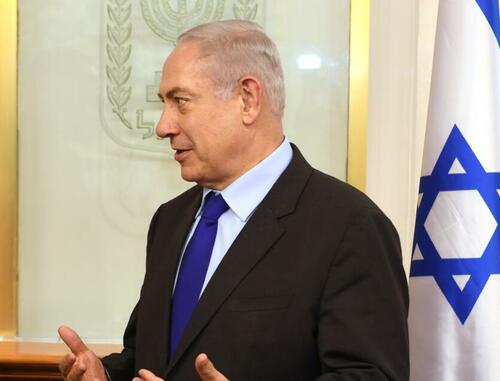
Authored by Joe Buccino via RealClear Wire,
In the eleventh week of its war with Hamas, Israel, undeterred by U.S. admonitions, continues to demolish an already-shattered Gaza. As senior American officials come in and out of Tel Aviv to meet with Netanyahu’s government, a glaring question looms unanswered: How much influence does America gain from its ardent, often unquestioning support for Israel? With more than $300 billion in military aid since World War II, the U.S. commitment to Israel is not just a matter of foreign policy, but a reflection of our national values and strategic interests. As Israel renders Gaza a dystopian hellscape in the face of international outrage, it is crucial to scrutinize this flow of funds, not only in dollars but in terms of international standing and moral authority.
Since its 1948 foundation, the U.S. has given Israel far more in military aid than any other nation. Uncritical U.S. support for Israel began with America’s 33rd president, Harry Truman publicly recognizing the state 11 minutes after its creation and continued through the successive 13 American presidencies. For most of the intervening 75 years, a country smaller than Massachusetts and roughly one-fifth the size of Kentucky has been the top recipient of financial American military assistance.
The U.S.-Israel partnership is rooted in several geopolitical and domestic considerations, among them the identification with a democracy - though recently Netanyahu’s right-wing coalition threatens notation. Dwight Eisenhower, replacing Truman in the White House in 1953, saw the Jewish State as a nation that largely shares American social values in a part of the world that primarily does not. Ike clung tight to Prime Minister David Ben-Gurion and the halls of American power followed.
Lyndon Johnson, ascending to the role of America's 36th president following JFK's assassination in 1963, held perhaps the strongest emotional attachment to Israel of any American president. A deep-rooted historical and religious conviction in the rights of the Jewish people to establish a state in their ancestral territories animated LBJ. Israel served as a central plank in Nixon’s foreign policy when he assumed office in 1969. Nixon’s National Security Advisor and Secretary of State Henry Kissinger established Israel as an anchor of American power in the Middle East, an ally with a cutting-edge military force in the world's most volatile region.
The majority of U.S. support is provided through military equipment grants, and from 1950 to 2020, the United States sourced the overwhelming majority of all IDF equipment. The Pentagon and State Department grant Israel access to the world's most sophisticated military technology, including the F-35 Joint Strike Fighter. Israel is the only Middle Eastern state to purchase the fifth-generation fighter jet. Israel has a fleet of 50 F-35s, purchased with U.S. assistance, with 25 more on the way.
Another factor in America’s tie with Israel - a critically important one among D.C. decision-makers - is the decades-long outsized influence of pro-Israel lobby groups. Such groups funnel far more funds to congressional candidates than any other group - more than six times that of the gun rights lobby.
For decades, American presidents have declared our tie to Israel "unshakeable," D.C.'s commitment to the Jewish state "ironclad," and American support to Israel as long-term. Israel has served as the beneficiary of all this unwavering assistance: without U.S. weapons, Arab nations would have long ago carved Israel up.
The flow of money continued without ebb In the face of significant settlement expansion in the West Bank. The American spigot continued to pour billions in the face of Netanyahu’s judicial overhaul bill that limited the power of Israel’s High Court and plunged the country into division and chaos. Unblinking American support for Israel is clear. What's less clear is how all this support advances American interests.
Such significant support over such a lengthy period would presumably have offered the D.C. the ability to influence Israel. That does not seem to be the case. President Biden criticized Israel over its indiscriminate bombing that has thus far flattened large swaths of Gaza. National Security Advisor Jake Sullivan publicly called on the IDF to shift to a more precise, targeted phase of fighting. Israel has thus far resisted this pressure, continuing with the aerial bombardments versus intelligence-driven ground assaults. As the international community laments the devastation in Gaza, the war threatens to damage American standing in the world.
Netanyahu also refuses to accept a role for any Palestinian body in the governance or security of Gaza after Hamas, insisting instead that Israel will exert control over the enclave. This places Israel at odds with the Biden administration which wants Palestinians to govern Gazans. The White House hopes a Palestinian-led arrangement will eventually lead to an improvement in political and economic conditions. Israel refuses. Despite these stark contrasts, U.S. administration officials publicly downplay any rift with the Netanyahu government on this or any other issue.
In the months ahead, America's hug of Israel will likely harm U.S. standing in the Arab world. The gruesome images of wounded Gazan children destroyed hospitals, and broken wasteland will grow etched in the psyche of the region. Meanwhile, Netanyahu will likely continue leading administration officials around by the nose.
After the protests in American streets die down and college campuses move on, the Arab streets will remember. The long-term harm to American interests in the region is unknowable. One casualty may be the efforts, begun under the Trump administration and beginning to show great promise just this past September, to build a regional security architecture of Sunni Arab militaries that will allow the Pentagon to shift assets to the Indo-Pacific, the priority region for American national security resourcing.
The United States' longstanding and unquestioning support for Israel, exemplified through extensive military aid and political backing, demands a thorough reevaluation. While this partnership has historical and geopolitical roots, the adjudication of the war in Gaza raises questions about the alignment of American interests and values with the actions and policies of the Israeli government. The imperviousness of Israel to U.S. influence risks America's standing in the international community, particularly in the Middle East. The time has come for the United States to demand more accountability and alignment with its principles in exchange for its support, redefining a relationship that is respectful of Israel's sovereignty and mindful of the broader implications for U.S. foreign policy and international reputation.
Joe Buccino is a retired U.S. Army colonel who served as U.S. Central Command communications director from 2021 until September 2023. He deployed to combat in the Middle East five times in his career. His views do not necessarily reflect those of the U.S. Department of Defense or any other organization.
Authored by Joe Buccino via RealClear Wire,
In the eleventh week of its war with Hamas, Israel, undeterred by U.S. admonitions, continues to demolish an already-shattered Gaza. As senior American officials come in and out of Tel Aviv to meet with Netanyahu’s government, a glaring question looms unanswered: How much influence does America gain from its ardent, often unquestioning support for Israel? With more than $300 billion in military aid since World War II, the U.S. commitment to Israel is not just a matter of foreign policy, but a reflection of our national values and strategic interests. As Israel renders Gaza a dystopian hellscape in the face of international outrage, it is crucial to scrutinize this flow of funds, not only in dollars but in terms of international standing and moral authority.
Since its 1948 foundation, the U.S. has given Israel far more in military aid than any other nation. Uncritical U.S. support for Israel began with America’s 33rd president, Harry Truman publicly recognizing the state 11 minutes after its creation and continued through the successive 13 American presidencies. For most of the intervening 75 years, a country smaller than Massachusetts and roughly one-fifth the size of Kentucky has been the top recipient of financial American military assistance.
The U.S.-Israel partnership is rooted in several geopolitical and domestic considerations, among them the identification with a democracy – though recently Netanyahu’s right-wing coalition threatens notation. Dwight Eisenhower, replacing Truman in the White House in 1953, saw the Jewish State as a nation that largely shares American social values in a part of the world that primarily does not. Ike clung tight to Prime Minister David Ben-Gurion and the halls of American power followed.
Lyndon Johnson, ascending to the role of America’s 36th president following JFK’s assassination in 1963, held perhaps the strongest emotional attachment to Israel of any American president. A deep-rooted historical and religious conviction in the rights of the Jewish people to establish a state in their ancestral territories animated LBJ. Israel served as a central plank in Nixon’s foreign policy when he assumed office in 1969. Nixon’s National Security Advisor and Secretary of State Henry Kissinger established Israel as an anchor of American power in the Middle East, an ally with a cutting-edge military force in the world’s most volatile region.
The majority of U.S. support is provided through military equipment grants, and from 1950 to 2020, the United States sourced the overwhelming majority of all IDF equipment. The Pentagon and State Department grant Israel access to the world’s most sophisticated military technology, including the F-35 Joint Strike Fighter. Israel is the only Middle Eastern state to purchase the fifth-generation fighter jet. Israel has a fleet of 50 F-35s, purchased with U.S. assistance, with 25 more on the way.
Another factor in America’s tie with Israel – a critically important one among D.C. decision-makers – is the decades-long outsized influence of pro-Israel lobby groups. Such groups funnel far more funds to congressional candidates than any other group – more than six times that of the gun rights lobby.
For decades, American presidents have declared our tie to Israel “unshakeable,” D.C.’s commitment to the Jewish state “ironclad,” and American support to Israel as long-term. Israel has served as the beneficiary of all this unwavering assistance: without U.S. weapons, Arab nations would have long ago carved Israel up.
The flow of money continued without ebb In the face of significant settlement expansion in the West Bank. The American spigot continued to pour billions in the face of Netanyahu’s judicial overhaul bill that limited the power of Israel’s High Court and plunged the country into division and chaos. Unblinking American support for Israel is clear. What’s less clear is how all this support advances American interests.
Such significant support over such a lengthy period would presumably have offered the D.C. the ability to influence Israel. That does not seem to be the case. President Biden criticized Israel over its indiscriminate bombing that has thus far flattened large swaths of Gaza. National Security Advisor Jake Sullivan publicly called on the IDF to shift to a more precise, targeted phase of fighting. Israel has thus far resisted this pressure, continuing with the aerial bombardments versus intelligence-driven ground assaults. As the international community laments the devastation in Gaza, the war threatens to damage American standing in the world.
Netanyahu also refuses to accept a role for any Palestinian body in the governance or security of Gaza after Hamas, insisting instead that Israel will exert control over the enclave. This places Israel at odds with the Biden administration which wants Palestinians to govern Gazans. The White House hopes a Palestinian-led arrangement will eventually lead to an improvement in political and economic conditions. Israel refuses. Despite these stark contrasts, U.S. administration officials publicly downplay any rift with the Netanyahu government on this or any other issue.
In the months ahead, America’s hug of Israel will likely harm U.S. standing in the Arab world. The gruesome images of wounded Gazan children destroyed hospitals, and broken wasteland will grow etched in the psyche of the region. Meanwhile, Netanyahu will likely continue leading administration officials around by the nose.
After the protests in American streets die down and college campuses move on, the Arab streets will remember. The long-term harm to American interests in the region is unknowable. One casualty may be the efforts, begun under the Trump administration and beginning to show great promise just this past September, to build a regional security architecture of Sunni Arab militaries that will allow the Pentagon to shift assets to the Indo-Pacific, the priority region for American national security resourcing.
The United States’ longstanding and unquestioning support for Israel, exemplified through extensive military aid and political backing, demands a thorough reevaluation. While this partnership has historical and geopolitical roots, the adjudication of the war in Gaza raises questions about the alignment of American interests and values with the actions and policies of the Israeli government. The imperviousness of Israel to U.S. influence risks America’s standing in the international community, particularly in the Middle East. The time has come for the United States to demand more accountability and alignment with its principles in exchange for its support, redefining a relationship that is respectful of Israel’s sovereignty and mindful of the broader implications for U.S. foreign policy and international reputation.
Joe Buccino is a retired U.S. Army colonel who served as U.S. Central Command communications director from 2021 until September 2023. He deployed to combat in the Middle East five times in his career. His views do not necessarily reflect those of the U.S. Department of Defense or any other organization.
Loading…





